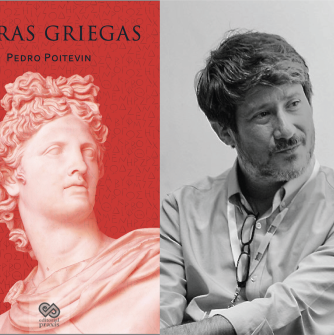| Contact |
Center for Research and Creative Activities
|
|---|
For over a decade, Professor Pedro Poitevin, from Salem State’s Mathematics department, has explored the interrelation between mathematics and literature through his poetry practice.
From an early age, Poitevin recalls his grandfather reciting works by Baroque-era Spanish poet Francisco de Quevedo, whom he attributes as one of the primary influences on his young love for poetry. His personal journey as a poet began as an intellectual interest disguised as emotional curiosity in 2010. Experimenting with different forms of poems, Poitevin tapped into his emotional self, allowing his writing to take a new direction while exploring mathematics and literature as overlapping disciplines of thought.
In his writing practice, Poitevin is interested in how poetic restrictions, like form and meter, allow the poet to examine the creative intersections of attention, freedom, and constraint. Driven by the understanding that mathematical language allows people to express definitive statements without ambiguity, Poitevin seeks to uncover the possibilities of creative expression within prescribed poetic parameters. For example, Poitevin challenged himself to write a villanelle that not only followed the form’s structural rules but also was a self-referential poem that personally moved him. The resulting poem, “I Feel the Memory of Writing You”, was accepted for publication by Rattle magazine and appeared in their Summer 2016 issue.
Driven by the understanding that mathematical language allows people to express definitive statements without ambiguity, Poitevin seeks to uncover the possibilities of creative expression within prescribed poetic parameters.
In September 2022, Poitevin released his second poetry collection, Letras griegas, which he says contains some of his best poetry over the past thirteen years. Written entirely in Spanish, Letras griegas contains formal and experimental poetry. The title, which translates to Greek letters, underscores the relationship between math and poetry: the Greek alphabet is used both to prove expressions in mathematical notations and, of course, in literature. The title, too, is a nod to ancient Greek myths that Poitevin’s references in his poems, which stem from his personal fondness of epic poems like the Iliad and the Odyssey.
While promoting the release of Letras griegas, which is available for purchase in Guatemala and Mexico, Poitevin attended the presentation of his new book at an event hosted by the publishing institution Fondo de Cultura Económica (FCE) in Guatemala. At the event, Poitevin had the opportunity to participate in conversations with the audience to discuss their personal insights of his work. The audience, Poitevin notes, was keen on recognizing specific details that are not explicitly evident in the text. This point especially pleased Poitevin, who enjoys writing poetry that obliquely refers to itself without providing an explanation for the reader. The reader, Poitevin says of these experiment works, must discover these elements for themselves.
While there is no underlying theme that unifies the collection, Poitevin notes that each poem contains immense focus on its structure and form. Throughout the Letras griegas, Poitevin has incorporated sonnets, villanelles, sonnet corona, and décimas – a traditional Spanish form consisting of four 10-line, rhyming stanzas. Writing within the constraints of these standard forms, Poitevin also elects to incorporate additional layers of structure, like writing sonnets and décimas that read as palindromes – poetry that reads the same backwards as it does forwards. In addition, readers can find Poitevin’s intention to modernize the sonnet by mixing the poetic structures of the sonnet and sestina to create what Poitevin refers to as a sonatina.
In the classroom, Poitevin’s perspective on teaching mathematics is informed by his interest in writing poetry. From his first-year to the senior-level undergraduate courses, Poitevin encourages students of mathematics to appreciate the beauty of what they are learning. When people think procedurally, Poitevin says, they can often fail to see the beauty of what they are doing. Rather, Poitevin urges students to view their mathematical results as inspiring while also recognizing the inherent beauty that the process possesses – a similar sentiment to how Poitevin views his own work in poetry.
Congratulations on your publication, Professor Poitevin!
----
Do you want to share your research and creative activities with the SSU community? Contact the CRCA at ssu-crca@salemstate.edu and tell us what you’ve been up to!

